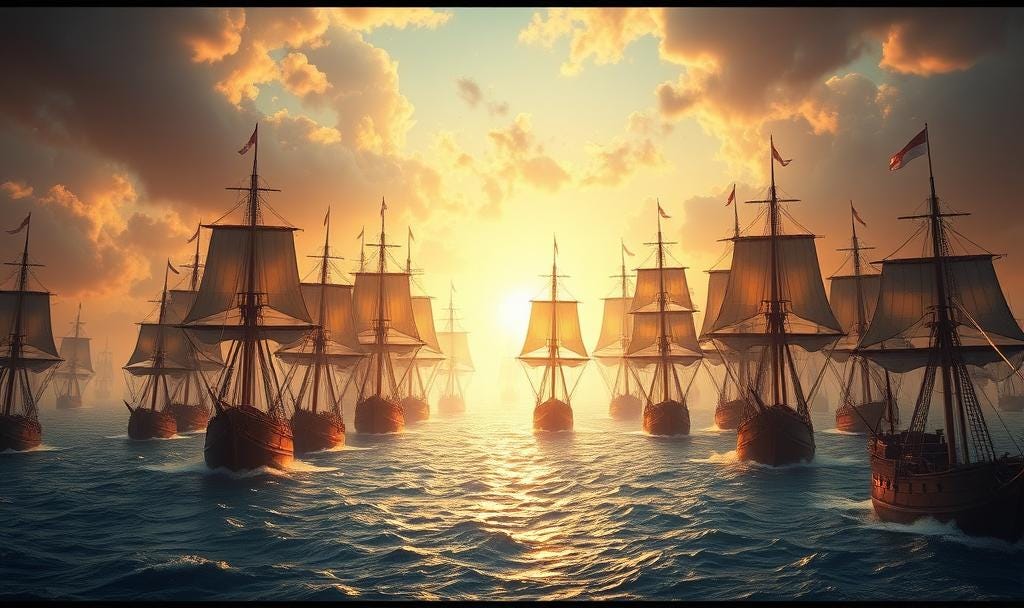Renewal in an Age of Managed Decline
If a nation stops reaching beyond itself, it will forfeit its reason for being. A state that denies any higher purpose will collapse into mere technical administration.
If the higher man must remake himself, the same logic applies to civilizations. The drive for transformation scales upward.
Change always involves the same essential choice: what deserves to survive and what must be abandoned. National overcoming requires grounding in something more fundamental than shifting circumstances: a fundamental inner truth.
Every great polity has been built upon the transformative will of those who seized power and imposed their vision—not through building a democratic consensus concerned only with the greatest good for the greatest number.
Sometimes those visions are forgotten, or the stories told about them miss their deeper meaning. This is why real change often starts with going back to the origins.
Great powers honor their tradition but are not obsessed with preserving it for its own sake, or managing decline with nicer language. The ones who prevail are those with the courage to burn away what has become exhausted and decadent within themselves.
But this doesn't mean believing in aimless change or rejecting foundational truths. On the contrary: real change is only possible when rooted in strong, eternal principles. Heraclitus said that we never step into the same river twice—but we step into a river nonetheless.
Only by distilling what essential inner truth and distinguishing it from circumstantial decisions can a people transform itself in ways that unleash its deeper energies, instead of tearing itself apart or becoming a deracinated faceless mass.
One of the most transformative decisions that a people, can take is indeed, a turn to become a sea state power.
Since humans are land creatures by nature, no people is born to the sea. They must make a fundamental choice to embrace it, which is why maritime powers tend to always embody such powerful vitalist energy.
Venice began as a Byzantine outpost on the edge of empire, but broke decisively from dependency to carve out a maritime republic that claimed the legacy of both Rome and classical Greece. Yet even as it built its own empire, it never ceased to honor its Roman-Byzantine roots.
England, was once a land of sheep-farming islanders with little naval tradition, made a fundamental decision for the sea and through centuries of ambition and adaptation rose to become the greatest sea power the world has ever seen. But beneath the sails, England preserved a distinct identity anchored in the ethos of its freeholding rural gentry.
Lesson. If a nation stops reaching beyond itself, it will forfeit its reason for being. A culture that fears expansive change will collapse into ritual and repetition. A state that denies any higher purpose will collapse into mere technical administration.
What matters the most here is timing. A polis needs to understand when the moment has come to be willing to cut what no longer serves its life.
Nations and civilizations decay just like individuals do. They get scared of their own potential. They settle into rituals, into habit, into fear. And once a nation believes its best days are behind it, once it decides it has nothing left to grow into, it starts to rot from within. We know this is true because that is what the West has been experiencing for decades now.
But here lies the paradoxical illness of our time. The liberal managerial state has institutionalized surface-level transformation as a way to protect real power structures..
We live under an ideological regime that glorifies constant change—fluid identities, shifting norms, redefined values—yet behind this performative dynamism lies a decision not to change anything fundamental.
Real transformation, whether personal or societal, requires rupture. And rupture threatens those whose power depends on managed continuity and decline. This is why genuine change gets displaced by spectacle.
However, a polis that no longer believes it must become something greater turns inward and eventually against itself. It will begin to question even its right of existence, and others will do to.
No state lasts without a reason to keep going. No culture survives if it stops asking what it’s meant to become. Without that drive, all that’s left is bureaucracy, repetition, and rotten flesh.
This is why we must reject the idea that any era of meaningful greatness belongs to the past—that we've reached the horizon's end for our people or civilization. The very notion of the End of History is a selfish lie told by a narcissistic generation.
To accept this is to strip ourselves of any purpose that could echo in eternity.
The truth is that the world will always exist not as a finished sculpture but as perpetual work in progress, shaped by our decisions. Great artists keep working until they die, often leaving unfinished works behind. This isn't tragedy but testament to their strength. Their refusal to be "completed" becomes their power to leave a legacy others must continue. That is the example we should follow.


